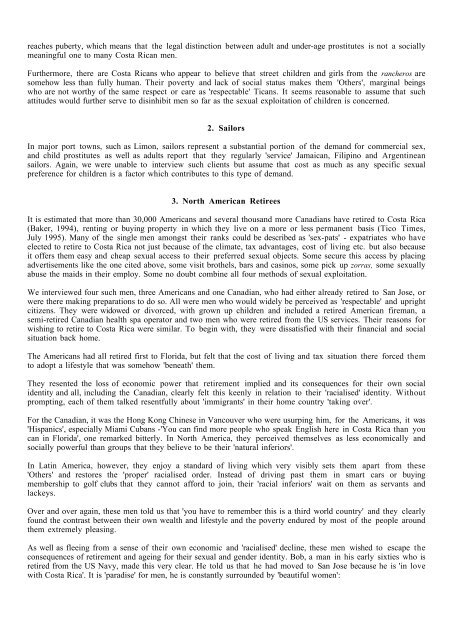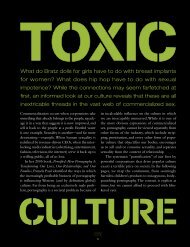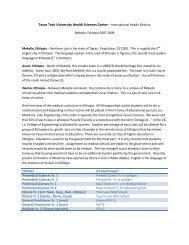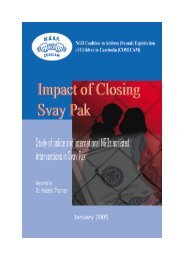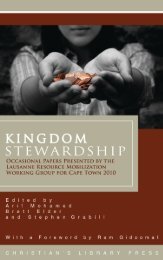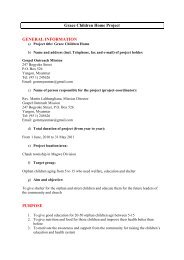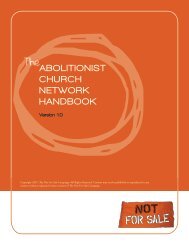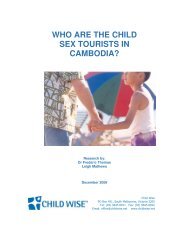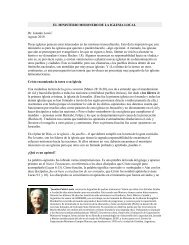Child Prostitution and Sex Tourism COSTA RICA - Consortium for ...
Child Prostitution and Sex Tourism COSTA RICA - Consortium for ...
Child Prostitution and Sex Tourism COSTA RICA - Consortium for ...
You also want an ePaper? Increase the reach of your titles
YUMPU automatically turns print PDFs into web optimized ePapers that Google loves.
eaches puberty, which means that the legal distinction between adult <strong>and</strong> under-age prostitutes is not a sociallymeaningful one to many Costa Rican men.Furthermore, there are Costa Ricans who appear to believe that street children <strong>and</strong> girls from the rancheros aresomehow less than fully human. Their poverty <strong>and</strong> lack of social status makes them 'Others', marginal beingswho are not worthy of the same respect or care as 'respectable' Ticans. It seems reasonable to assume that suchattitudes would further serve to disinhibit men so far as the sexual exploitation of children is concerned.2. SailorsIn major port towns, such as Limon, sailors represent a substantial portion of the dem<strong>and</strong> <strong>for</strong> commercial sex,<strong>and</strong> child prostitutes as well as adults report that they regularly 'service' Jamaican, Filipino <strong>and</strong> Argentineansailors. Again, we were unable to interview such clients but assume that cost as much as any specific sexualpreference <strong>for</strong> children is a factor which contributes to this type of dem<strong>and</strong>.3. North American RetireesIt is estimated that more than 30,000 Americans <strong>and</strong> several thous<strong>and</strong> more Canadians have retired to Costa Rica(Baker, 1994), renting or buying property in which they live on a more or less permanent basis (Tico Times,July 1995). Many of the single men amongst their ranks could be described as 'sex-pats' - expatriates who haveelected to retire to Costa Rica not just because of the climate, tax advantages, cost of living etc. but also becauseit offers them easy <strong>and</strong> cheap sexual access to their preferred sexual objects. Some secure this access by placingadvertisements like the one cited above, some visit brothels, bars <strong>and</strong> casinos, some pick up zorras, some sexuallyabuse the maids in their employ. Some no doubt combine all four methods of sexual exploitation.We interviewed four such men, three Americans <strong>and</strong> one Canadian, who had either already retired to San Jose, orwere there making preparations to do so. All were men who would widely be perceived as 'respectable' <strong>and</strong> uprightcitizens. They were widowed or divorced, with grown up children <strong>and</strong> included a retired American fireman, asemi-retired Canadian health spa operator <strong>and</strong> two men who were retired from the US services. Their reasons <strong>for</strong>wishing to retire to Costa Rica were similar. To begin with, they were dissatisfied with their financial <strong>and</strong> socialsituation back home.The Americans had all retired first to Florida, but felt that the cost of living <strong>and</strong> tax situation there <strong>for</strong>ced themto adopt a lifestyle that was somehow 'beneath' them.They resented the loss of economic power that retirement implied <strong>and</strong> its consequences <strong>for</strong> their own socialidentity <strong>and</strong> all, including the Canadian, clearly felt this keenly in relation to their 'racialised' identity. Withoutprompting, each of them talked resentfully about 'immigrants' in their home country 'taking over'.For the Canadian, it was the Hong Kong Chinese in Vancouver who were usurping him, <strong>for</strong> the Americans, it was'Hispanics', especially Miami Cubans -'You can find more people who speak English here in Costa Rica than youcan in Florida', one remarked bitterly. In North America, they perceived themselves as less economically <strong>and</strong>socially powerful than groups that they believe to be their 'natural inferiors'.In Latin America, however, they enjoy a st<strong>and</strong>ard of living which very visibly sets them apart from these'Others' <strong>and</strong> restores the 'proper' racialised order. Instead of driving past them in smart cars or buyingmembership to golf clubs that they cannot af<strong>for</strong>d to join, their 'racial inferiors' wait on them as servants <strong>and</strong>lackeys.Over <strong>and</strong> over again, these men told us that 'you have to remember this is a third world country' <strong>and</strong> they clearlyfound the contrast between their own wealth <strong>and</strong> lifestyle <strong>and</strong> the poverty endured by most of the people aroundthem extremely pleasing.As well as fleeing from a sense of their own economic <strong>and</strong> 'racialised' decline, these men wished to escape theconsequences of retirement <strong>and</strong> ageing <strong>for</strong> their sexual <strong>and</strong> gender identity. Bob, a man in his early sixties who isretired from the US Navy, made this very clear. He told us that he had moved to San Jose because he is 'in lovewith Costa Rica'. It is 'paradise' <strong>for</strong> men, he is constantly surrounded by 'beautiful women':


